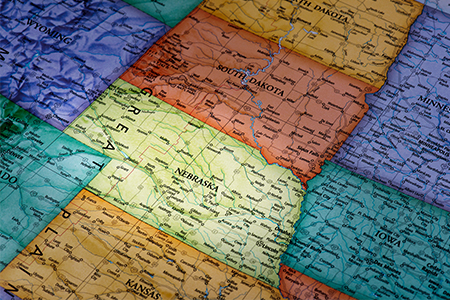You May Also Like
NEBRASKA CPA EXAM & LICENSE REQUIREMENTS 2024
Here is how to become a CPA in Nebraska.

The field of accountancy continues to grow at a healthy pace. As the economy grows, tax codes becomes increasingly complex, as does compliance and every other aspect of business and finance. Therefore, if you are an accountant or are considering the field, you will want to investigate your state’s requirements for the profession’s top license: the Certified Public Accountant (CPA). Every state has unique requirements, and Nebraska is no exception. Here is how to become a CPA in Nebraska.
Nebraska has no age limitations for CPAs, but it does ask that you have a Social Security number, meet their residency requirement and complete 150 semester hours of academic work. You will not need to be a U.S. citizen, but the state will ask that you pass an Ethics exam. Nebraska has a more stringent requirement for real-world experience than other states, and asks for the completion of two years of supervised work.
Academic Standards
Nebraska is one of several states that requires you to complete 150 hours of academic work before you take the CPA exam. Those hours must include the acquisition of a bachelor’s degree as well as plenty of courses in upper-level and/or graduate courses. Since a bachelor’s program often takes only 120 hours, you will be best served by continuing your education at the postgraduate level. Accountants are in high demand, and those with advanced degrees, such as the Master of Accountancy (MAcc), are all the more esteemed in the workplace.
To satisfy the Nebraska Board of Public Accountancy, your transcripts must reflect certain types of courses. To start, you will need to work with your advisor to ensure that you complete 30 hours of upper-level accounting courses, including, but not limited to the following subjects:
- Financial Accounting Theory
- Managerial/Cost Accounting
- Taxation
- Auditing
- Information Systems
- Accounting for Government and/or Non-Profits
You will also need 36 hours of courses in business-related classes, including these types of topics:
- Macro Economics
- Micro Economics
- Business Law
- Marketing
- Management
- Business Communications
- Business Ethics
- Principles of Accounting
Once you have completed your coursework, you will qualify to sit for the CPA examination. You must send official transcripts from every institution you have attended, even if it was for a single course. Some registrars can send official transcripts electronically, but if not, send the sealed—and your transcripts must be sealed—envelope to:
CPA Examination Services – NE
P.O. Box 198469
Nashville, TN 37219
CPA Examination
Once your transcripts have been accepted, you will receive a Notice to Schedule (NTS). Upon receipt of the NTS, you have six months to schedule and sit for at least one portion of the 4-part exam. If you fail to take one portion of the test in that window, you will have to reapply and pay your application fee again.
Make sure that you are as prepared as you possibly be. Applicants often must retake all or part of the exam before they are able to pass it all. You might seek out commercial, non-credit preparation courses, or self-study modules that you can work on at your own pace. Since the exam is so difficult, you might find others who wish to study in groups to prepare. Nevertheless, you will be expected to show mastery of these four aspects of accountancy:
- Financial Accounting and Reporting–This section covers financial reporting frameworks from several industry experts. Candidates are asked to compare statements that reflect different reporting standards.
- Auditing and Attestation–This part tests your knowledge of the International Standards of Auditing as well as U.S. standards.
- Regulation–Your professional and legal responsibilities are covered in this section of the test.
- Business Environment and Concepts–This portion covers general business concepts and international business. Your writing skills will be tested as well in this portion.
Once you pass the exam, you will be provided a CPA certificate, but not a full license. You will be able to use the designation on business correspondence, but you will not be allowed to sign financial reporting documents.
Ethics Examination
After you pass the CPA test, you will need to pass an Ethics exam prepared by the American Institute of Certified Public Accountants (AICPA). You can order a CD-ROM from the AICPA that includes an 11-hour self-study ethics course and a series of multiple choice questions for study and review. The exam itself is open-book and you must pass with a score of 90 or better.
The AICPA is a professional organization that also creates the CPA exam. They will be a valuable resource for you as a practicing accountant.
Experience
Nebraska’s work requirements are above and beyond the norm. The state requires two years prior to licensure, where other states require one. You will need to work under a licensed CPA who can sign off on your application and vouch for your competency in the field.
Your career as a Nebraska CPA is bound to be rewarding. To discover more about the career and state licensure, including renewals, reinstatements and continuing education, visit the board’s website: Nebraska Board of Public Accountancy.